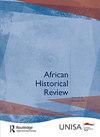No Maize, No Life: Conservation, Maize Production, and African Responses in Colonial Southern Malawi, 1920–1960
IF 0.2
Q3 HISTORY
引用次数: 0
Abstract
Abstract This study explores the history of maize production to demonstrate the extent to which colonial conservation interspersed with economic expediency stifled African production from 1920 to 1960. Drawing on archival and oral evidence from southern Malawi, it argues that colonial restriction on maize production to conserve the country’s soil fertility was an excuse by the state to achieve various economic interests. What the colonial state in Malawi wanted was to divert the Africans from the production of maize to other crops whose global market demand and value was high. This was critical during the post-depression era when settler agriculture collapsed, and even worse in the post-war period when Britain desperately required African agriculture for its economic recovery. But since maize had become their life-blood, African producers, with the support of some colonial officials who shared similar fears, could not submit to this restrictive policy. By forefronting maize production, the study sheds new light on the socio-environmental historiography which has generically attributed the implementation of colonial conservation policies in Africa to economic depression, drought, demography, the American dust bowl, colonial land policies, and local farming practices.没有玉米,就没有生命:保护、玉米生产和非洲对马拉维南部殖民地的反应,1920-1960
摘要:本研究探讨了玉米生产的历史,以证明1920年至1960年殖民保护与经济权宜之计在多大程度上抑制了非洲的玉米生产。根据马拉维南部的档案和口述证据,该报告认为,为了保护该国的土壤肥力,殖民时期限制玉米生产是国家实现各种经济利益的借口。马拉维的殖民国家想要的是将非洲人从玉米的生产转移到其他全球市场需求和价值高的作物上。这在后大萧条时期至关重要,因为移民农业崩溃了,而在战后英国迫切需要非洲农业来恢复经济的时期,情况更糟。但由于玉米已经成为他们的命脉,非洲的生产者在一些有着同样担忧的殖民地官员的支持下,无法屈服于这种限制性政策。通过对玉米生产的前沿研究,该研究揭示了社会环境史学的新视角,该史学通常将非洲殖民保护政策的实施归因于经济萧条、干旱、人口、美洲尘暴、殖民土地政策和当地农业实践。
本文章由计算机程序翻译,如有差异,请以英文原文为准。
求助全文
约1分钟内获得全文
求助全文

 求助内容:
求助内容: 应助结果提醒方式:
应助结果提醒方式:


